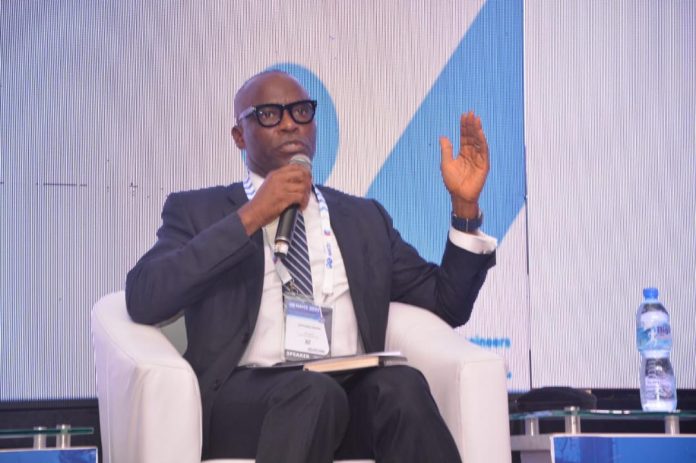The Managing Director of ANOH Gas Processing Company Limited has highlighted both the opportunities and challenges in Nigeria’s oil and gas supply chain landscape, stressing the urgent need for technology and strategy to work hand in hand.
Speaking at the just concluded NAICE 2025 Conference in Lagos, Okon said:“Nigeria is not a very competitive landscape business wise for our industry — our Unit Technical Costs (UTC), Unit Development Cost (UDC) and Unit Operating Expenditure (Unit OPEX) are quite high, ranging from $10 to $40/boe,” he noted.In a low oil and gas price environment most Nigerian assets will not be economic to attract investments in the form of equity or debt or any form of funding. “From reservoir to export/market, inventory, logistics, and transportation represent one of the largest cost areas. The question investors now ask is simple: how strong are your Environment, Social and Governance (ESG) scores in support of responsible and sustainable investment? Because this determines how much capital you can attract into your business.”
He explained that the deployment of innovative technologies such as just in time inventory systems can significantly reduce costs while supporting sustainability targets and operational excellence.
“Using technology to drive the supply chain can have a very big impact in terms of cost competitiveness,” he said, “and at the same time, you reduce your carbon intensity, supporting sustainability goals while keeping your business profitable.”
Okon stressed that involving the supply chain very early in our business processes is very critical to achieving success, starting early from ideation, feasibility assessment, concept select, preFEED, etc. all the way through to tendering and contract awards was essential. “Once you build technology into your supply chain, you can make the right decisions that drive competitiveness and efficiency,” he observed.
ALSO READ:
- Falcon Corporation Secures ‘A’ Long-Term, ‘A1’ Short-Term Credit Ratings from Agusto & Co. with Stable Outlook
- Vsolaris, REA Partner to accelerate Minigrid Electrification across Nigeria
- SNEPCo shuts down Bonga for two months Turnaround Maintenance
- NUPRC Prioritises Technical, Financial Capacity in Licensing Round Guidelines
- SEEPCO’s donor club tackles blood shortages to save lives
Balancing Scale and Efficiency drawing a contrast between multibillion-dollar international oil companies (IoCs) projects and the small to medium cap Nigerian indigenous or independents,
Okon underscored the importance of scale.“On one hand, you have $5 to $20 billion projects in the IoCs; on the other, independents managing projects of just $100 to 200million annually. You really can’t apply the same global practices directly,” he explained.
“But technology gives us the tools to adapt — whether through block chain, automating procurement, integrating robotics into vendor selection, or using digital contracting systems to drive transparency.”He also pointed out some challenges in Nigeria’s contracting space, where interference from all sources often undermines efficiency. “That’s why we believe building a digital, end-to-end contracting system is critical. As the saying goes, what you can’t see, you can’t measure or improve. That visibility is what drives efficiency,” he remarked.
The Cost of Insecurity turning to Nigeria’s operational environment, Okon recalled a time when the country was one of the most cost-efficient producers globally.“In the early 1990s, Shell and other IoCs were producing at just $2–$3 per barrel, with production in the Shell East hitting 500,000 bopd and the Shell West over 500,000 bopd as well, leading to Nigeria producing over 2 million bopd comfortably at very low cost. But once insecurity escalated, we started doubling down on security spending. Today, each time you operate in the Niger Delta, you may need to mobilize an entire trailer load of soldiers and police. That’s where the costs balloons.”
He warned that without addressing insecurity, inefficiency, and community relations, Nigeria’s competitiveness would remain undermined.
“In the Middle East or Gulf of Mexico, operators don’t face this kind of burden. Until we resolve it, we cannot bring our technical costs under control,” he cautioned.T
Technology Must Align with Strategy
Okon was quick to emphasize that technology alone is not enough. “Strategy is equally critical,” he said.
“Take Tullow Oil, which saw its market capitalization fall from $20 billion in 2010 to under $300 million today. Tullow Oil, which was brilliant in exploration but struggled to transition into production. This industry is unforgiving when strategy and technology are not aligned.”
A Call to HomeGrown Innovation
The ANOH Gas chief challenged Nigerians to focus on practical, homegrown solutions or adapt imported models to our unique or peculiar challenges.“We have to start creating solutions right here at home. For example, in AGPC ANOH plant design, there will be no routine flaring and the heat from the gas turbine exhaust at 400degC will be used for plant boiler and other heating requirements. The assets and the problems are before us, we just need innovative thinking to solve them.”






